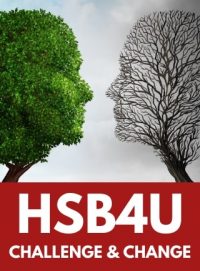HSB4U Course (Challenge And Change In Society)
Send Us A Message
HSB4U - Grade 12 Challenge and Change in Society
Course Code: HSB4U
Course Type: University Preparation
Format: Online School Course
Credit Value: 1.0
Prerequisite: Any university, university/college, or college preparation course in Social Sciences and Humanities, English, or Canadian and World Studies
Tuition Fee (CAD): $574
Course Description For HSB4U Grade 12 Challenge and Change in Society Online Course
Challenge and Change in Society: This course focuses on the use of social science theories, perspectives, and methodologies to investigate and explain shifts in knowledge, attitudes, beliefs, and behaviour and their impact on society. Students will critically analyse how and why cultural, social, and behavioural patterns change over time. They will explore the ideas of social theorists and use those ideas to analyse causes of and responses to challenges such as technological change, deviance, and global inequalities. Students will explore ways in which social science research methods can be used to study social change.
Summary Of Units And Timelines For Grade 12 Challenge and Change in Society HSB4U
Challenge and Change in Society: When students are engaged in active and experiential learning, they tend to retain knowledge for longer periods and to develop, acquire, and integrate key skills more completely. Some of the teaching and learning strategies that are suitable to material taught in computer studies include:
Debates | Guided internet research | Direct Instructions |
Presentations | Discussion Groups | Movies and videos |
Interactive activities | Research projects | Model making |
Visuals | Multimedia presentations | Diagrams |
Problem solving | Discussion groups | Interviews |
Assessment is a systematic process of collecting information or evidence about a student’s progress towards meeting the learning expectations. Assessment is embedded in the instructional activities throughout a unit. The expectations for the assessment tasks are clearly articulated and the learning activity is planned to make that demonstration possible. This process of beginning with the end in mind helps to keep focus on the expectations of the course. The purpose of assessment is to gather the data or evidence and to provide meaningful feedback to the student about how to improve or sustain the performance in the course. Scaled criteria designed as rubrics are often used to help the student to recognize their level of achievement and to provide guidance on how to achieve the next level. Although assessment information can be gathered from a number of sources (the student himself, the student’s course mates, the teacher), evaluation is the responsibility of only the teacher. For evaluation is the process of making a judgment about the assessment information and determining the percentage grade or level.
The assessment will be based on the following processes that take place in the classroom:
| Assessment FOR Learning | Assessment AS Learning | Assessment OF Learning |
|---|---|---|
During this process the teacher seeks information from the students in order to decide where the learners are and where they need to go. | During this process the teacher fosters the capacity of the students and establishes individual goals for success with each one of them. | During this process the teacher reports student’s results in accordance to established criteria to inform how well students are learning. |
| Conversation | Conversation | Conversation |
Classroom discussion Self-evaluation Peer assessment | Classroom discussion Small group discussion Post-lab conferences | Presentations of research Debates |
| Observation | Observation | Observation |
| Drama workshops (taking direction) Steps in problem solving | Group discussions | Presentations Group Presentations |
| Student Products | Student Products | Student Products |
| Reflection journals (to be kept throughout the duration of the course) Check Lists Success Criteria | Practice sheets Socrative quizzes | Projects Poster presentations Tests In Class Presentations |
Assessment is embedded within the instructional process throughout each unit rather than being an isolated event at the end. Often, the learning and assessment tasks are the same, with formative assessment provided throughout the unit. In every case, the desired demonstration of learning is articulated clearly and the learning activity is planned to make that demonstration possible. This process of beginning with the end in mind helps to keep focus on the expectations of the course as stated in the course guideline. The evaluations are expressed as a percentage based upon the levels of achievement.
A variety of strategies are used to allow students opportunities to attain the necessary skills for success in this course and at the post-secondary level of study. To facilitate learning, the teacher uses a variety of activities engaging the whole class, small groups, and individual students.
Some of the approaches to teaching/learning include
Strategy | Purpose | Who | Assessment Tool |
Class discussion | Formative | Teacher/student | Observation Checklist |
Class Debates | Formative | Teacher | Rubric or marking scheme |
Daily class work | Formative | Teacher/student | Observation Checklist |
Assignments | Summative | Teacher | Rubric or marking scheme |
Written test | Summative | Student | Marking scheme |
Project | Formative | Teacher/student | Marking scheme |
Final written exam | Summative | Teacher/student | Marking scheme |
The evaluation of this course is based on the four Ministry of Education achievement categories of knowledge and understanding (25%), thinking (25%), communication (25%), and application (25%). The evaluation for this course is based on the student’s achievement of curriculum expectations and the demonstrated skills required for effective learning.
The percentage grade represents the quality of the student’s overall achievement of the expectations for the course and reflects the corresponding level of achievement as described in the achievement chart for the discipline.
A credit is granted and recorded for this course if the student’s grade is 50% or higher. The final grade for this course will be determined as follows:
- 70% of the grade will be based upon evaluations conducted throughout the course. This portion of the grade will reflect the student’s most consistent level of achievement throughout the course, although special consideration will be given to more recent evidence of achievement.
- 30% of the grade will be based on a final evaluation of two products administered at the end of the course. The first product is a Project, subdivided into three distinct subsections and is worth 15% of the overall course marks. This Project will be evaluated using a marking scheme and a rubric. The second product will be a final exam of well-formulated multiple choice questions requiring information from the whole course as well as the student’s reports completed through-out the course.
Potential Resources
Teachers will bring additional resources and teaching materials that provide a rich and diverse learning environment.
Textbook
Challenge and Change in Society: Patterns, Trends & Shifts in Society
Frequently Asked Questions (FAQ)
This course explores social science theories, investigating how changing knowledge, attitudes, and behaviors impact society.
It helps you develop critical thinking skills about technological change, global inequalities, and evolving social norms.
You need any university, university/college, or college preparation course in Social Sciences and Humanities, English, or Canadian and World Studies.
Expect debates, interactive discussions, guided research, presentations, and multimedia activities to deepen engagement.
Yes, a 30% final evaluation comprising a major project and a final exam covers material learned throughout the course.

